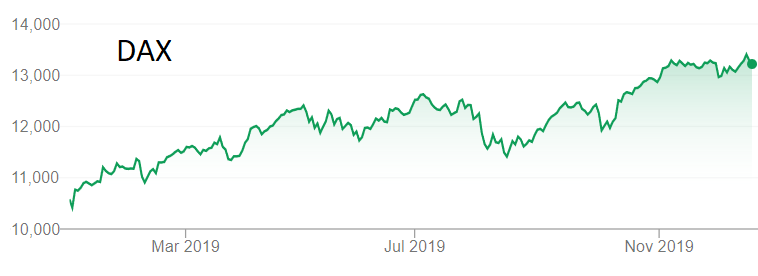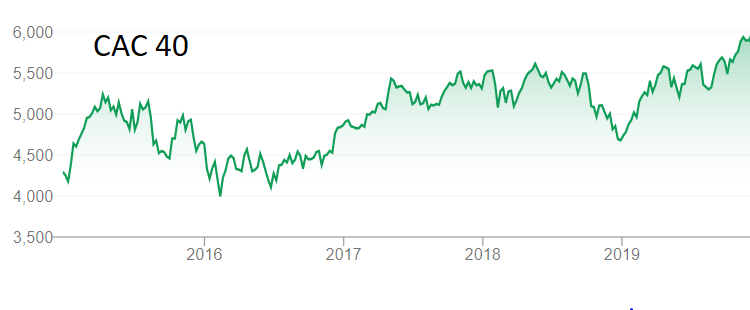Fortune will favour the choosy investor in Europe
Investors in Europe should look to solid companies in these sectors, argues our overseas stocks expert.
27th December 2019 15:54
by Rodney Hobson from interactive investor
Investors in Europe should look to solid companies in these sectors, argues our overseas stocks expert.

Rodney Hobson is an experienced financial writer and commentator who has held senior editorial positions on publications and websites in the UK and Asia, including Business News Editor on The Times and Editor of Shares magazine. He speaks at investment shows, including the London Investor Show, and on cruise ships. His investment books include Shares Made Simple, the best-selling beginner's guide to the stock market. He is qualified as a representative under the Financial Services Act.
In these circumstances, investors seeking opportunities in Europe should look to solid companies such as pharmaceuticals and well capitalized banks that have stayed clear of controversy and have strong balance sheets. Concentrate on the economically stronger countries such as Germany, France and the Netherlands.
Looking further ahead, there should be an opportunity to seek out for cyclical stocks if the Eurozone starts to pick up. The car industry is a case in point. It has suffered heavily as consumers have postponed replacing vehicles, but such decisions cannot be put off forever.
Tread carefully. Fortune will favour the choosy investor in Europe. Those already have had a prosperous 2019 with the CAC 40, the main French index, rising from 4,700 points to just shy of 6,000, while the DAX in Germany has risen from 10,500 to over 13,000. Pretty good going on a continent that is supposedly struggling.
A year of great uncertainty is coming to an end for Europe. A year of great uncertainty is just beginning. Investors looking for opportunities just across the Channel will need to tread cautiously. However, there could well be wonderful opportunities for those willing to grasp the chances that will inevitably arise.
Although it is a comparatively small issue on the world scale, the impending departure of the United Kingdom from the European Union is massive for the Continent, which has a trade surplus with the UK. Any false steps will inevitably hurt European countries even though the impact will be spread over the 27.
At least the result of the general election here means everyone knows that we really are leaving. The end of more than three years of uncertainty and parliamentary logjam at Westminster is surely good for all concerned; it is possible to argue that the state of limbo that has brought Britain grinding to a virtual economic halt was the worst possible situation for everyone.
The real work begins now, for all that has been agreed so far is a transition to a full deal that is due to be completed by the end of 2020. Some commentators feel that is a tall order, but they could be wrong. Negotiations on the tougher aspects of the transition deal didn’t really get going until the deadline was looming; only when time was running out did things really move. It is likely, therefore, that a tight timetable for the next phase of talks will concentrate minds.
- Why ‘Brexit boom’ could last 18 months
- Diversifying your portfolio is easy with these ii Super 60 recommended funds
Speculation has inevitably begun over how strong a line Boris Johnson will take. Some pundits reckon that with his large majority he will be able to defy the hardline Brexiteers and take a softer approach. That sounds like wishful thinking. Johnson will surely let his success go to his head.
A more important question is how hardline the European negotiators turn out to be. There are major changes in leadership in Brussels, with German Defence Minister Ursula von der Leyen replacing Jean-Claude Juncker as EU Commission president and Belgian prime minister Charles Michel succeeding Donald Tusk as President of the European Council. Chief Brexit negotiator Michel Barnier provides continuity, and he has wasted no time in calling the timetable unrealistic. He will no doubt prefer to delay the inevitable if he can as the full withdrawal of the UK will leave a €10 billion a year hole in the EU’s budget.
In a case of the tail wagging the dog, the nations that are net recipients of European Union funds have the upper hand over those such as Germany, France and the Netherlands that are footing the bill. In the absence of general agreement on increasing or reducing total expenditure, each year’s spending total remains the same as the previous year. On the other hand, EU rules forbid a budget deficit. So when the UK eventually leaves and takes its cheque book with it, the net contributors will have to make up most of the difference.
Barnier can no longer count on the House of Commons blocking a no deal Brexit. While he is in charge of the talks, there will be pressure on him to secure a deal that protects European economies at a time when the slowdown in global trade is having an impact on the Continent.

Source: interactive investor Past performance is not a guide to future performance
Germany, Europe’s powerhouse, has narrowly avoided falling into recession but it enters 2020 in an uncertain state. Long-serving Chancellor Angela Merkel is going through a lengthy and reluctant departure.
Her successor has already been chosen but Merkel will stand down in her own good time. She hands over a rocky coalition government with a reluctant partner in the Social Democrats, who have suffered in successive elections and have themselves been through a leadership struggle, while the far right and the Greens have surged in opposition.
The scope for a government boost to the economy is limited, as the German government, like the EU itself, must by law balance its budget.
Recent economic figures have been mixed. Industrial production, for example, declined by 1.7% from September to October to stand 5.3% below October 2018 levels, and the economy as a whole is expected to show growth of only 0.2% in the final quarter of 2019. The fear is that a prolonged recession in manufacturing will spill over into the service sector.
However, confidence among German firms, particularly in the service sector, has turned more upbeat. The Munich-based Ifo economic institute reported that its monthly survey of 7,000 companies had risen to 95 in November, making three consecutive monthly rises after falls in 17 of the previous 21. At worst, the German economy is bottoming out; at best it will show a rebound after this year’s stagnation.
French president Emmanuel Macron has done his best to fill the political vacuum in Europe left by the stasis in Germany, but the populace is conspiring against him. The weekly protests by gilets jaunes ran right through the spring and summer; now strikers threaten to add a winter of discontent.

Source: interactive investor Past performance is not a guide to future performance
Railway workers went on strike this month in protest against plans to end their generous pension arrangements that, among other things, allow train drivers to retire in their early fifties. Ominously, bus drivers, hauliers, hospital workers, airline ground crew, air traffic controllers, postal workers and other groups joined in support of the striking train drivers.
Macron is trying to consolidate France’s 42 pension schemes into a single system but, as previous presidents have found, attempts to reform labour regulations and practices are likely to run into a storm of active protests. As he has also alienated farm workers fearing for their livelihoods and hospital workers claiming that resources devoted to health are dwindling, the upheaval is likely to continue.
Should the Eurozone need a boost, the reins at the European Central Bank are in new hands. Mario Draghi has been a remarkable success as the bank’s president, talking the talk without always having the ready ammunition to deal with the many problems that the zone has faced in recent years. His successor Christine Lagarde warned after her first meeting that the risks are on the downside but she claimed that the zone’s economy is bottoming out. She forecasts growth of 1.1% in 2020, roughly on a par with 2019.
In these circumstances, investors seeking opportunities in Europe should look to solid companies such as pharmaceuticals and well capitalized banks that have stayed clear of controversy and have strong balance sheets. Concentrate on the economically stronger countries such as Germany, France and the Netherlands.
Looking further ahead, there should be an opportunity to seek out for cyclical stocks if the Eurozone starts to pick up. The car industry is a case in point. It has suffered heavily as consumers have postponed replacing vehicles, but such decisions cannot be put off forever.
Tread carefully. Fortune will favour the choosy investor in Europe. Those already have had a prosperous 2019 with the CAC 40, the main French index, rising from 4,700 points to just shy of 6,000, while the DAX in Germany has risen from 10,500 to over 13,000. Pretty good going on a continent that is supposedly struggling.
Rodney Hobson is a freelance contributor and not a direct employee of interactive investor.
These articles are provided for information purposes only. Occasionally, an opinion about whether to buy or sell a specific investment may be provided by third parties. The content is not intended to be a personal recommendation to buy or sell any financial instrument or product, or to adopt any investment strategy as it is not provided based on an assessment of your investing knowledge and experience, your financial situation or your investment objectives. The value of your investments, and the income derived from them, may go down as well as up. You may not get back all the money that you invest. The investments referred to in this article may not be suitable for all investors, and if in doubt, an investor should seek advice from a qualified investment adviser.
Full performance can be found on the company or index summary page on the interactive investor website. Simply click on the company's or index name highlighted in the article.
Disclosure
We use a combination of fundamental and technical analysis in forming our view as to the valuation and prospects of an investment. Where relevant we have set out those particular matters we think are important in the above article, but further detail can be found here.
Please note that our article on this investment should not be considered to be a regular publication.
Details of all recommendations issued by ii during the previous 12-month period can be found here.
ii adheres to a strict code of conduct. Contributors may hold shares or have other interests in companies included in these portfolios, which could create a conflict of interests. Contributors intending to write about any financial instruments in which they have an interest are required to disclose such interest to ii and in the article itself. ii will at all times consider whether such interest impairs the objectivity of the recommendation.
In addition, individuals involved in the production of investment articles are subject to a personal account dealing restriction, which prevents them from placing a transaction in the specified instrument(s) for a period before and for five working days after such publication. This is to avoid personal interests conflicting with the interests of the recipients of those investment articles.